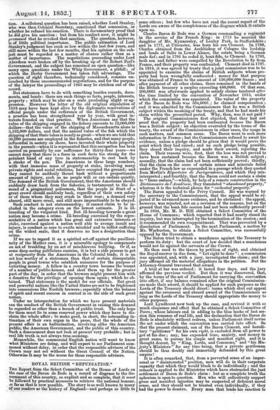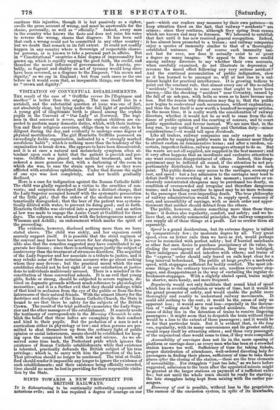ROYAL BRITISH " REPUDIATION."
Tim Report from the Select Committee of the House of Lords on the case of the Baron de Bode is a record of disgrace to the Go- vernment of this country, so explicit and so complete, that it must be followed by practical measures to retrieve the national honour, so far as that is now possible. The story is as well known to many of our readers as the history of England—and perhaps as little to some others ; but few who have not read the recent report of the Lords are aware of the completeness of the disgrace which it entails upon us. Charles Baron de Bode was a German commanding a regiment in the service of the French King : in 1'775 he married the daughter of Mr. Kynnersley, of Loxley Park, in Staffordshire ; and in 1777, at Uttoxeter, was born his son Clement. In 1788, Charles obtained from the Archbishop of Cologne the lordship and lands of Sultz in Lower Alsace, the estate being a German male fief; and in 1791 he ceded it, bon& fide, to Clement. In 1793, both son and father were compelled by the Revolution to fly from France, and their property was confiscated. Clement died in 1797. In 1814, it was agreed by treaty that a joint commission was to be appointed to examine the claims of British sub'ects whose pro- perty had been wrongfully confiscated : money for that purpose was obtained of France to the amount of 130,000,000 francs ; and after payment of all other claims, there remained in the hands of the British treasury a surplus exceeding 480,0001. Of that sum, 200,000/. was afterwards applied to satisfy claims tendered after the time limited by the convention of November 1815, under which the commission was appointed. The value of the property of the Baron de Bode was 364,000/. ; he claimed compensation ; and it was admitted by the Commissioners that he was a British subject within the meaning of the treaty, and that he had made his claim within the prescribed period. Why, then, was it not paid ?
The original Commissioners first objected, that they had not proof that the property had been confiscated because the Baron was a British subject : an objection overruled by the terms of the treaty, the award of the Commissioners in other cases, the usage in such matters, and common sense. The Baron went to seek more information in France ; but the Commissioners refused to await his evidence, unless a pledge should be given that it would prove the point which they had raised ; and no such pledge being possible, they closed their inquiry, and made their award, rejecting the claim. Their reasons were, first, that the loss was not proved to have been sustained because the Baron was a British subject ; secondly, that the claim had not been sufficiently proved ; thirdly, that the claim on the score of certain mines and minerals failed under the French law as expounded, in a passage which they quoted from Merlin's _Repertoire de Jurisprudence, and which they mis- interpreted ; and fourthly, that the Baron could not sustain a claim to " biens caducs,"—which, by help of a remote construction in the Dictionnaire de 1' Academie, they translated "abandoned property," whereas it is the technical phrase for " escheated property."
The Baron appealed to the Privy Council. He was warned by the secretary to the Commissioners, that the appeal would be re- jected if he advanced more evidence, and he abstained : the appeal, however, was rejected, not on a revision of the reasons, but on the ground that the bona fide cession had not been sufficiently proved! In 1834, Mr. M. D. Hill obtained a Select Committee of the House of Commons ; which reported that it had nearly closed its inquiry, but was interrupted by the termination of the session ; and it recommended its own reappointment. That was prevented by a dissolution of Parliament. In the next Parliament, a motion by Mr. Warburton, to obtain a Select Committee, was successfully opposed by the Government. The Baron tried to obtain a mandamus against the Treasury to perform its duty : but the court of law decided that a mandamus would not lie against the servants of the Crown. He then sued to the Queen by petition of right, and obtained the Royal answer in due form, " Let right be done " : a commission was appointed, and, with a jury, investigated the claim; and the jury affirmed all the material allegations in the petition. But the Attorney-General traversed that award. A trial at bar was ordered it lasted four days, and the jury affirmed the previous verdict. But then it was discovered, that, by the terms of the act of Parliament for carrying the convention into effect, if any balance remained after the original Commission- ers made their award, it should be applied for such purposes as the Lords of the Treasury should direct : terms which shut out appeal against the erroneous and absurd award of the Commissioners so long as the Lords of the Treasury should appropriate the money to other purposes. Lord Lyndhurst now took up the case, and revived it with so much eloquence and effect that he obtained a Select Committee of Peers ; whose labours end in adding to the blue books of last ses- sion this romance of real life, and the declaration that the Baron de Bode is absolutely without redress, unless Parliament itself revise the act under which the convention was carried into effect. So that the present claimant, son of the Baron Clement, and heredi- tary " ipetitioner " for his own right, is excluded from all power to get at his due ; nay, has expended time, anxiety, and money in great sums, to pursue his simple and manifest right, and it is thought decent, by "King, Lords, and Commons," and "his Ma- jesty's Ministers" for any time being, that a private gentleman should be thus doubly and immortally defrauded by this great empire!
It is often remarked, that, from a perverted sense of an imper- sonal or " disinterested " position, men will do in their corporate capacity that which they would blush to do individually ; and the remark is applied to the Ministries which have obstructed the just settlement of Baron de Bode's claim: but as a'complete truth the aphorism is open to question. Men who will collectively support gross and manifest injustice may be suspected of deficient moral sense, and they should not be trusted even individually, if they had the power to deceive. Every man that lends his sanction to
continue this injustice, though it is but passively as a cipher, swells the gross account of wrong, and must be answerable for the shame, personally, as well as " officially." Indeed, every man in the country who knows the facts and does not raise his voice to reverse the wrong, shares that disgrace. It has been said that such a wrong could not be committed in any other country but but we doubt that remark in its full extent. It could not readily happen in any country where a Sovereign of respectable charac- ter governs, or is known to take a personal part in affairs. But in " Constitutional" countries a false dogma of impersonality has grown up, which is rapidly sapping the good faith, the credit, and therefore the moral influence of governments. In Austria, pro- bably, so flagrant and shabby an act of tyranny would long since have been reversed, as a disgrace to the Emperor, "his crown and dignity," as we say in England ; but from such cases as the one before us it would seem that, as inseparable things, our Queen has no " crown and dignity."



























 Previous page
Previous page